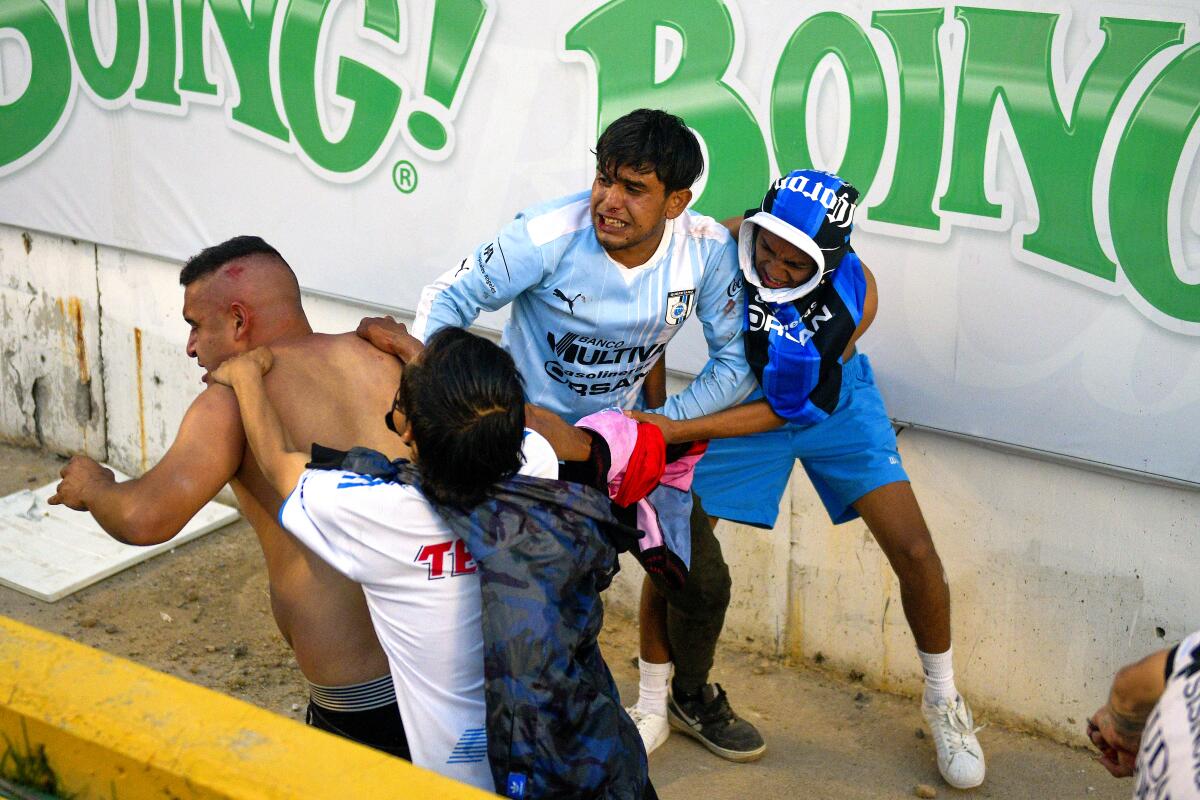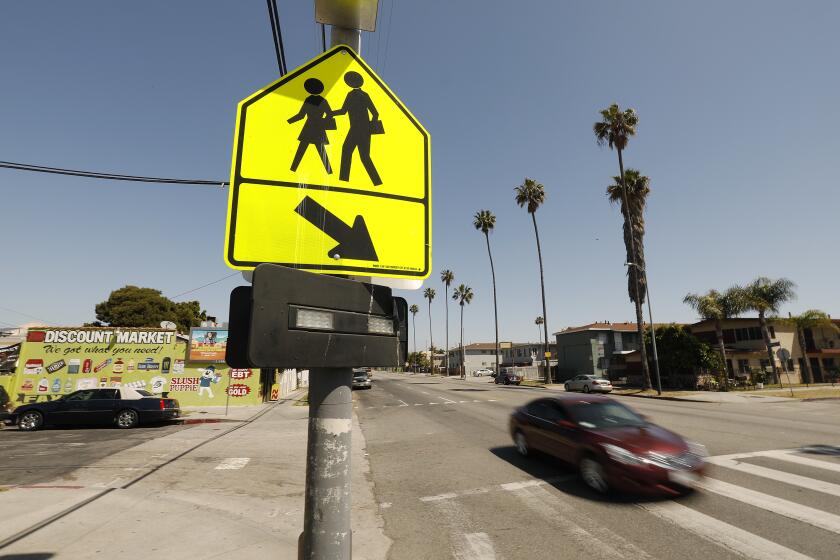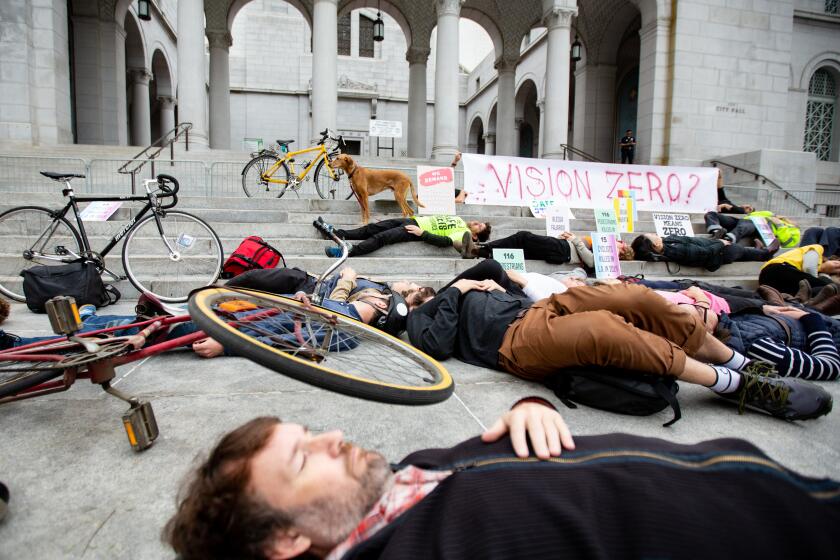What’s at play when fans at a soccer game decide to brutally riot?

- Share via
As the world reels from actual war — the appalling invasion of Ukraine by Russia — where average citizens are taking up arms to save their country, it’s incomprehensible that the same violent us-versus-them dynamic would play out on a soccer pitch on a sunny afternoon where fans gathered to watch their teams play.
And yet, that is exactly what happened on Saturday in central Mexico, when fans of one professional soccer team appear to have set upon fans of the rival team during the game in a bloody brawl that descended into chaos.
The tribalism sports teams inspire is something I will never understand. I just don’t give a fig about who wins. I sometimes watch basketball or football on TV, but I am a proud fair-weather fan — one who watches the last quarter of an important game just so can I understand what everyone is talking about the next day.
My lack of sports passion is something I have thought about for years, particularly when I was married to a man whose moods rose and fell according to the fortunes of the USC Trojan football team. His behavior was especially mystifying because he was a product of the University of California. His identification with the team peaked during the Pete Carroll era, which lasted from 2001 to 2009 and resulted in two national titles.
So, yay for USC.
But I simply could not understand why my husband’s Saturday was ruined if the Trojans lost. He got sulky and snappish. I learned to steer clear at those times and came to understand his identification with USC football as something akin to addiction, with highs and lows, something that rendered him powerless when he was in its grip.
One thing I knew for sure, though. As passionate a sports fan as he was, he would never, ever have thrown a punch at a rival team’s fans, as happened last weekend in Mexico when scores of soccer fans succumbed to their most brutal impulses.
On Saturday, I happened to be in the Guadalupe Valley in northern Baja California and was surprised to see my news feeds full of gory news — not from Ukraine — but from the central Mexico town of Querétaro.
Minutes into the second half of a soccer match between Guadalajara’s Atlas, the reigning champions, and the hometown team, Querétaro FC, fans instigated a violent riot that spilled onto the field and made people run for their lives.
As my colleague Kevin Baxter wrote, “Fans attacked one another with chairs, metal bars, knives, belts, fists and feet.” Hard-core Querétaro fans, he wrote, are called barras bravas, or “fierce gangs,” the south-of-the-border equivalent of the United Kingdom’s sports hooligans. On Saturday, they lived up to their reputation. Most victims were Atlas fans, authorities said.
It’s going to take a sea change in our thinking to make roads safer
This was brutal, hand-to-hand combat, where “enemies” identified each other by their team shirts.
My feeds were full of savage and heartbreaking images, including the sight of one terrified family — mother, father and two boys — running across the field, holding hands. The older child, who looked to be about 10, was bare from the waist up, his shirt apparently removed to help keep him safe. There were videos of officers dragging a naked, unconscious man away and of security guards watching the fighting without intervening. One video seemed to show a security guard opening a gate-like barrier that was supposed to keep the opposing fans apart.
On Monday, Mexican authorities said that more than 25 people had been injured, at least three critically. But spectators and at least one reporter, TV Azteca journalist David Medrano, said people were killed in the violence. Later, Medrano apologized for claiming there had been deaths, saying his emotions had gotten the better of him. Many fans are still questioning the official government reports that said no one had died.
Querétaro Gov. Mauricio Kuri confirmed that one injured fan had lost an eye as a result of the blows he received. Another fan remained in grave condition after experiencing a stroke.
On Tuesday, the Querétaro attorney general’s office released a photograph of 10 suspects who had been arrested in connection with the brawl. Many of the tips came from social media. Mexico’s Liga MX announced that the owners of the Querétaro club have been banned from the league for five years.
Reams of sociological and psychological research over the decades have attempted to explain the intense identification that fans have with their chosen teams, and the ways in which they act out in victory and defeat. (There is nothing weirder to me than the tradition of the post-championship riot. And it is worth noting that most of these episodes are entirely male-driven.)
In 1991, a pair of University of Kansas psychologists argued that strong identification with teams “provides a buffer from feelings of depression and alienation, and at the same time, fosters feelings of belongingness and self-worth.”
That makes sense.
In 2011, New York Times journalist Adam Sternbergh wrote a charming essay about the emotional perils of fandom after the Boston Red Sox, favored to win the American League East championship and perhaps even make it to the World Series, blew a nine-game lead and missed the playoffs entirely that year.
Letters to the Editor: Hey, Vision Zero critics, how many traffic deaths are acceptable to you?
The goal of Vision Zero to completely eliminate all traffic deaths is tough to achieve, but we must work toward getting there.
Being a sports fan, wrote Sternbergh, “allows you to feel real emotional investment in something that has no actual real-world consequences…. As a fan, you will feel actual joy or actual pain — this is precisely what non-sports-fans usually ridicule about being a sports fan — in relation to events that really don’t affect your life at all.”
In theory, this is true.
But the many people terrorized and injured last Saturday would surely disagree.
More to Read
A cure for the common opinion
Get thought-provoking perspectives with our weekly newsletter.
You may occasionally receive promotional content from the Los Angeles Times.













